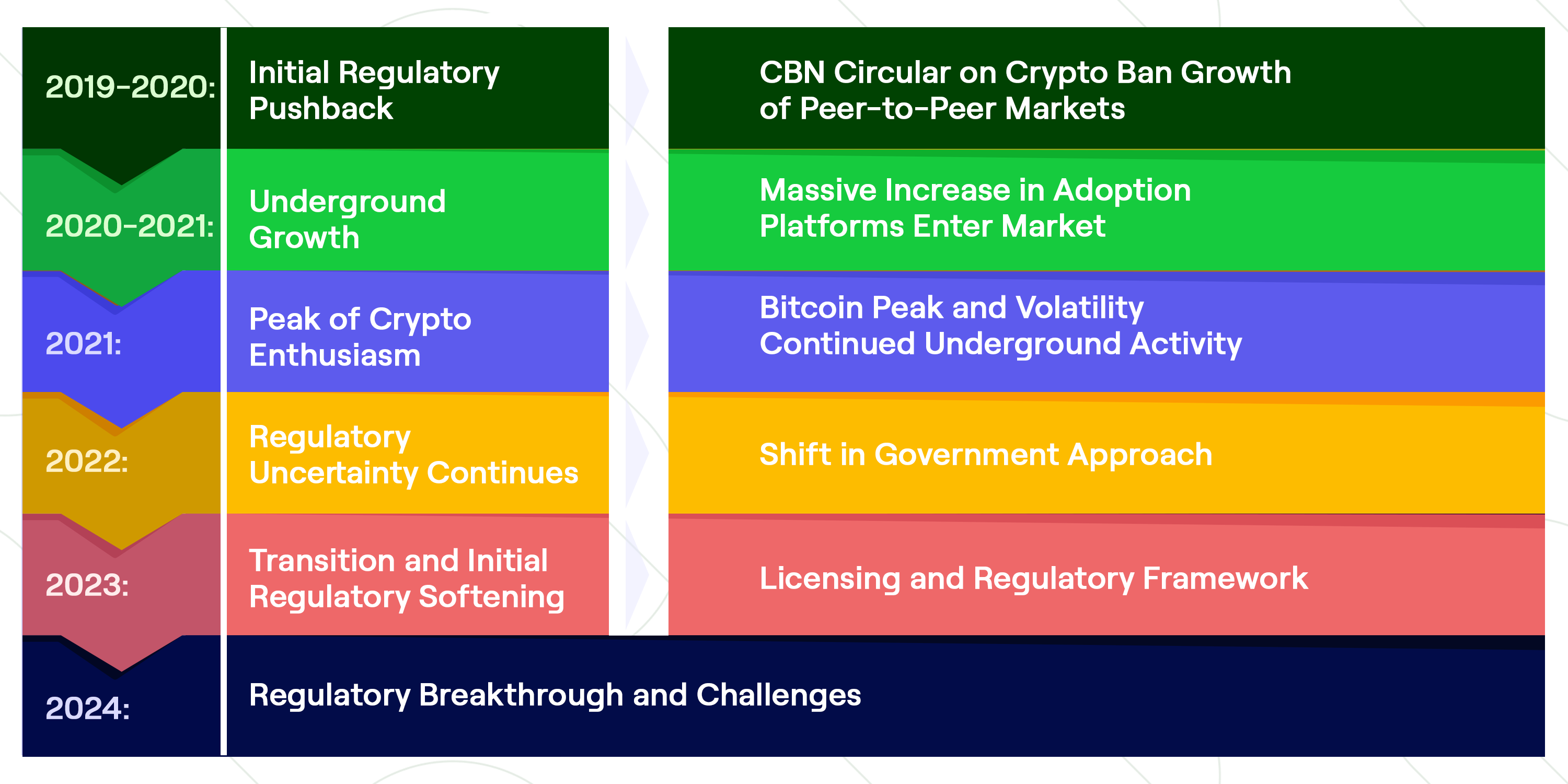
Beyond Currency: Nigeria's Digital Financial Revolution
Introduction: The Dawn of a New Financial Era
Imagine a financial landscape where innovation knows no boundaries, young minds rewrite economic engagement rules, and technology becomes the great equaliser. This isn't a distant dream—it's happening in Nigeria.
Our 2024 Cryptocurrency Adoption Report is more than a collection of statistics; it's a testament to Nigerian youth's resilience, curiosity, and transformative spirit. In a world where traditional financial systems have often left many behind, digital assets emerge as a beacon of hope, opportunity, and unprecedented financial democratisation. Read the report here: Busha Cryptocurrency Report 2024
Nigeria's Cryptocurrency Journey: A Chronological Exploration (2020-2024)
Few nations have experienced a journey as dynamic as Nigeria in the vibrant and often unpredictable cryptocurrency world. From cautious optimism to governmental clampdowns and then to an unprecedented boom, the Nigerian crypto narrative is nothing short of remarkable. Let’s rewind to 2020 and chart the rollercoaster ride that has positioned Nigeria as a global powerhouse in cryptocurrency activity.
The Early Surge: Binance’s Entry
The crypto wave hit Nigerian shores with a significant splash in March 2020 when Binance, one of the largest global crypto exchanges, established its presence in the country. This move marked the beginning of a growing awareness and interest in digital currencies among Nigerians, particularly the tech-savvy youth.
The Ban That Sparked a Revolution
Just as the momentum began to build, February 5, 2021, brought a seismic shift. The then-President Muhammadu Buhari, through the Central Bank of Nigeria (CBN), issued a directive banning financial institutions from facilitating cryptocurrency transactions. This policy aimed to stifle the burgeoning market but instead acted as a catalyst for ingenuity.
Nigerians, undeterred by the restrictions, turned to virtual private networks (VPNs) to bypass the ban and access crypto platforms. This period saw explosive growth in peer-to-peer (P2P) trading as citizens sought alternative ways to buy and sell cryptocurrencies.
A Boom Amid Restrictions
Between 2021 and 2023, Nigeria witnessed an unexpected crypto boom. Informal P2P services became the lifeblood of the market, enabling transactions outside traditional banking channels.
The entrepreneurial spirit of Nigerians, coupled with the ease and speed of crypto transactions, propelled the country to global prominence. By 2022, Nigeria had entered the top 10 countries for cryptocurrency activity worldwide. The trend continued, with the nation securing the second spot globally by 2024, according to Chainalysis. Notably, Nigeria also became the second-largest P2P market in the world, trailing only India and standing as the sole African nation in the top 50.
Momentum-Changing Events (2021-2024)
Launch of the eNaira
In October 2021, the Central Bank of Nigeria (CBN) introduced the eNaira, a central bank digital currency (CBDC), aiming to provide a regulated digital payment option. This move was seen as an attempt to counter the growing popularity of decentralised cryptocurrencies.
Regulatory Developments
In 2022, the Securities and Exchange Commission (SEC) issued the Digital Assets Rules, representing the first comprehensive regulation of digital and virtual assets in Nigeria. This framework aimed to provide clarity and oversight for digital asset activities within the country.
Detention of Binance Executives
In February 2024, Nigerian authorities detained Tigran Gambaryan, Binance's head of financial crime compliance, on charges including money laundering and tax evasion. This incident highlighted the increasing scrutiny of cryptocurrency activities by Nigerian regulators.
International Exchanges Exiting Nigeria
Following regulatory clampdowns in early 2024, several international cryptocurrency exchanges reconsidered their operations in Nigeria. While specific names are not detailed in the available sources, the increased regulatory pressure led to a reevaluation of their presence in the Nigerian market.
New Challenges Under New Leadership
The tide turned again in February 2024 when Nigeria’s newly elected President clamped down on cryptocurrencies. This renewed regulatory hostility prompted several international exchanges to exit the Nigerian market, signaling another phase of uncertainty. Despite these challenges, the foundational resilience of the Nigerian crypto ecosystem remained unshaken.
Despite the regulatory challenges in early 2024, Nigeria's cryptocurrency ecosystem demonstrated remarkable resilience. Major international exchanges, notably Binance and Bybit, not only maintained their presence but also reported significant growth.
Binance, for instance, reportedly recorded $23 billion in deposits throughout 2024, underscoring its robust engagement with the Nigerian market.
Bybit also experienced substantial user growth, crossing 40 million users after gaining 10 million new users in less than a month in 2024.
Leading indigenous platforms, Busha and Quidax achieved significant milestones by obtaining Nigeria's first crypto exchange licenses in September 2024, signalling a move towards regulatory acceptance and further fostering the growth of formal regulated markets.
Collectively, these developments highlight Nigeria's steadfast position as a leading hub for cryptocurrency activity, with both international and local platforms contributing to its dynamic and rapidly evolving crypto landscape.

Nigeria's Crypto Revolution: Young, Mobile, and Ready for More
Nigeria's latest comprehensive crypto adoption report paints a fascinating picture of a digital financial revolution in motion. The data, gathered from over 1,500 respondents, including traders, first-time users, and experts, reveals a landscape dominated by tech-savvy youth (87% between 18-34) who primarily trade on mobile phones. While Bitcoin remains king and trust in crypto continues to grow, some challenges persist - notably a significant gender gap (92% male users) and relatively small trading balances (70% under $100). Perhaps most tellingly, an overwhelming 90% of respondents want to learn more about digital assets, signalling the massive potential for growth in Africa's largest economy.
Want to dive deeper into Nigeria's crypto transformation? Check out the full report to explore detailed insights on trading patterns, blockchain preferences, stablecoin adoption, and strategic recommendations for fostering wider crypto adoption in Nigeria. Busha Cryptocurrency Report 2024
Conclusion: The Unstoppable Wave of Financial Empowerment
We stand at the precipice of a financial revolution. What these numbers truly reveal is not just adoption but a profound awakening. Nigeria isn't just participating in the global digital economy—we are pioneering it.
Every young Nigerian with a smartphone is not just a user, but a potential architect of a new financial future. The 90% hunger for knowledge, the 96% belief in growth and the mobile-first approach are not mere insights; they are the battle cries of a generation ready to reshape economic landscapes.
Our Collective Potential
- We are bridging knowledge gaps
- We are breaking traditional financial barriers
- We are creating opportunities where none existed before
- We are proving that innovation has no geographical limits
The future isn't something that happens to us. It's something we create. And right now, in the hands of Nigeria's young, tech-savvy generation, that future is looking brighter, more inclusive, and more promising than ever before.
Disclaimer:
The views and opinions expressed in this blog post are solely those of the author (Boluwatife Akande), a Senior Research Analyst at Busha, and do not necessarily reflect the official policies or positions of Busha as a company. This content is provided for informational purposes only and should not be considered financial or investment advice. Readers are encouraged to conduct their own research or consult a qualified financial advisor before making any financial decisions related to cryptocurrency or digital assets.

